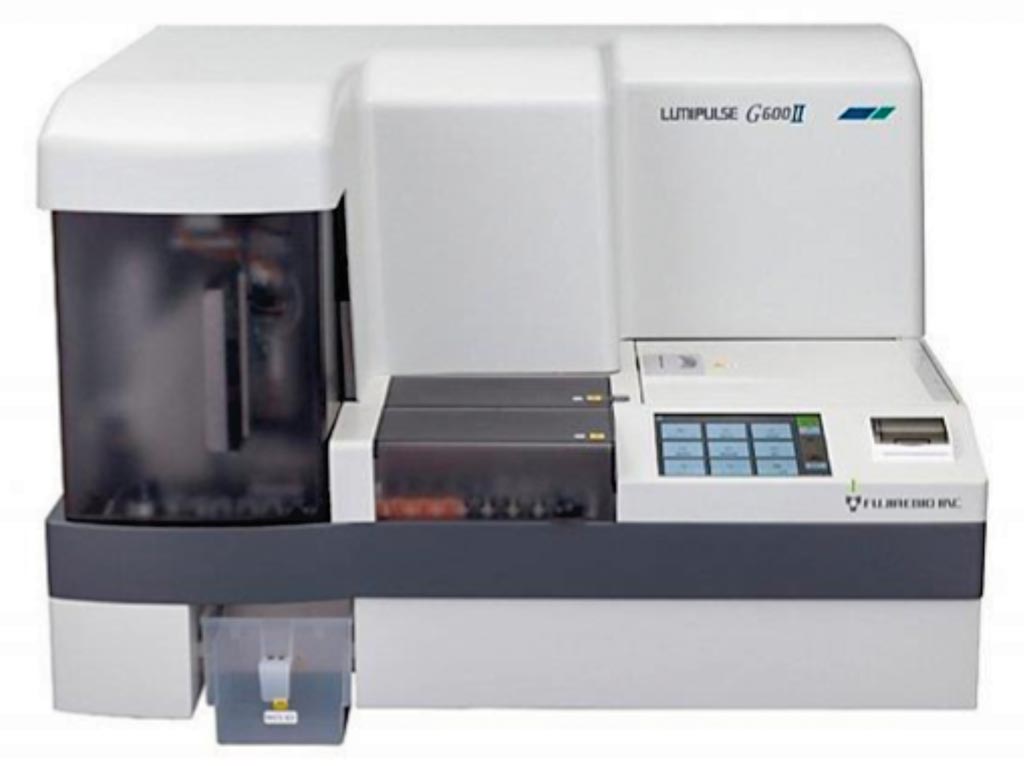Fibroblast Growth Factor 23 Associated with Diabetic CV Risks
By LabMedica International staff writers
Posted on 26 Oct 2019
There is an association between higher levels of fibroblast growth factor 23 (FGF23), and greater cardiovascular and mortality risks for adults with type 2 diabetes and normal or mildly impaired kidney functionPosted on 26 Oct 2019
Fibroblast growth factor 23 is a protein that in humans is encoded by the FGF23 gene. FGF23 is a member of the fibroblast growth factor (FGF) family, which is responsible for phosphate (phosphate homeostasis) and vitamin D metabolism.

Image: The Lumipulse G600 II is a fully automated benchtop chemiluminescent enzyme immunoassay analyzer (Photo courtesy of Fujirebio Europe).
Medical scientists at the University of Groningen (Groningen, the Netherlands) and their colleagues assessed FGF23 levels in 310 adults with type 2 diabetes and an eGFR of 60 mL/min/1.73 m2 or more (mean age, 61.5 years; 42.1% women) from the Diabetes and Lifestyle Cohort Twente (DIALECT) study. In addition, the team used hospital surveillance data to evaluate all-cause mortality and major adverse cardiovascular (CV) events across a median of 5.8 years of follow-up.
Plasma C-terminal FGF23 levels were determined by sandwich ELISA, with intra-assay and interassay coefficients of variation of 0.5% and 0.16% respectively. Phosphate, albumin and creatinine were determined by a colorimetric method with COBAS 6000. Parathyroid hormone (PTH) was determined by the electrochemiluminescence sandwich immunoassay method using COBAS 6000. 25-hydroxy vitamin D was determined by electrochemiluminescence sandwich immunoassay with Lumipulse. HbA1c was measured by the Roche Tina‐quant 3rd generation immunoturbidimetric method.
The team reported that compared with 110 participants with an eGFR of less than 60 mL/min/1.73 m2 from the original DIALECT cohort, those included in the analysis had lower FGF23 levels (84.2 relative units/mL versus 146.5 relative units/mL). There is an association between higher levels of FGF23, and greater cardiovascular and mortality risks for adults with type 2 diabetes and normal or mildly impaired kidney function. They also reported 28 deaths and 47 major adverse CV events among participants. In fully adjusted models, they found all-cause mortality risk was 2.74 times greater and major adverse CV event risk was 1.56 times greater with each doubling of FGF23. Additionally, in fully adjusted models, the researchers found all-cause mortality risk was 3.33 times greater with each doubling of FGF23 for those with an eGFR of at least 90 mL/min/1.73 m2, although major adverse CV event risk was not changed by a statistically significant margin.
Martin H. de Borst, MD, PhD, a consultant nephrologist and a co-author of the study said, “So far, most studies had focused on the role of FGF23 in patients with reduced kidney function. Now, we have shown that FGF23 levels are also linked with adverse outcomes in patients with type 2 diabetes and normal or mildly impaired kidney function. This hormone may therefore be relevant to a larger group of individuals than previously thought.”
The authors concluded that in patients with type 2 diabetes and normal or mildly impaired kidney function, FGF23 is associated with an increased risk of cardiovascular events and mortality. The study was published in the October 2019 issue of the journal Diabetes Care.
Related Links:
University of Groningen














